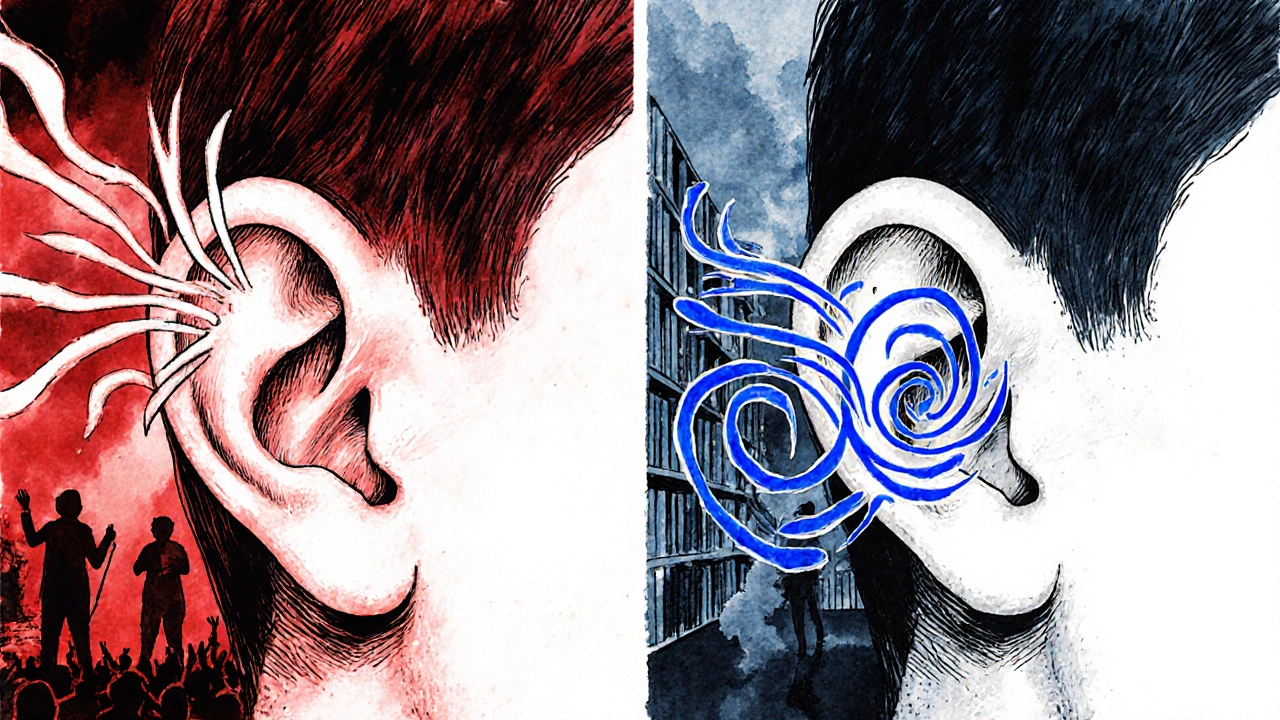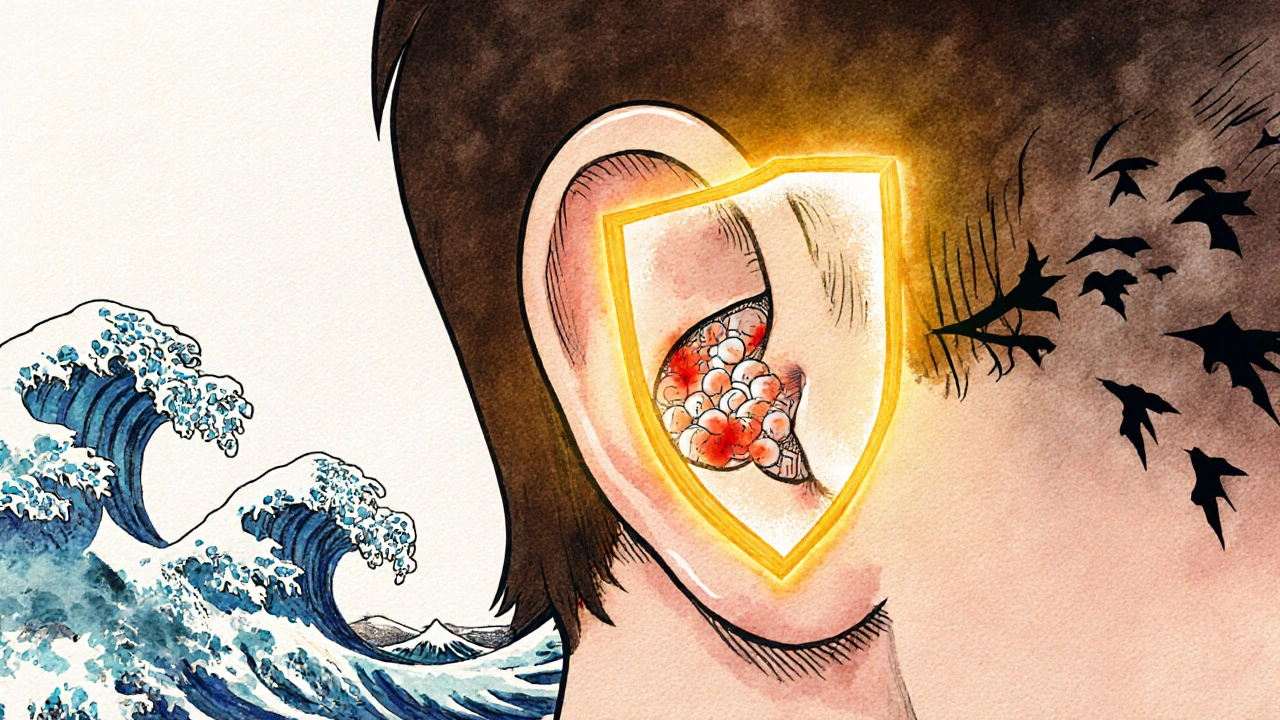Every year, millions of people reach for aspirin for headaches, fever, or joint pain. But few know it might also be quietly protecting their hearing. If you’ve ever noticed ringing in your ears after a loud concert or felt muffled hearing after a cold, you’re not alone-and aspirin might play a role in how your ears recover. While it’s not a cure, research shows aspirin has real, measurable effects on ear health that go beyond pain relief.
How aspirin affects the inner ear
Aspirin, or acetylsalicylic acid, works by blocking enzymes that cause inflammation and pain. But those same enzymes are also active in the cochlea-the snail-shaped part of your inner ear that turns sound waves into electrical signals your brain understands. When you’re exposed to loud noise, these enzymes go into overdrive, triggering swelling and oxidative stress that can damage the tiny hair cells responsible for hearing.
Studies from the National Institute on Deafness and Other Communication Disorders (NIDCD) found that aspirin can reduce this damage by lowering inflammation in the cochlea. In animal models, pretreatment with aspirin led to significantly less permanent hearing loss after noise exposure. While human trials are more limited, the pattern holds: aspirin helps stabilize the inner ear’s chemical environment during stress.
Aspirin and tinnitus: the double-edged sword
Here’s where it gets tricky. Many people report ringing in the ears-tinnitus-after taking high doses of aspirin. That’s not a myth. Doses above 4,000 mg per day can temporarily cause or worsen tinnitus in up to 25% of users. But here’s the twist: low-dose aspirin (81-100 mg daily) may actually help reduce chronic tinnitus in some cases.
A 2022 study in the Journal of Otology followed 1,200 adults with persistent tinnitus. Those taking low-dose aspirin daily for six months showed a 30% greater reduction in symptom severity compared to the placebo group. The researchers believe this is due to improved blood flow in the tiny vessels supplying the inner ear. Aspirin’s mild blood-thinning effect helps oxygen reach damaged areas, potentially calming overactive nerve signals that cause ringing.
Important note: If you start aspirin and your tinnitus gets worse, stop and talk to your doctor. The effect is usually reversible once you stop taking it.
Preventing noise-induced hearing loss
Think of aspirin like a shield for your ears during high-risk moments. Musicians, construction workers, and military personnel are often exposed to dangerous noise levels. In controlled settings, people who took a single 325 mg dose of aspirin one hour before loud noise exposure had less temporary threshold shift-a measure of short-term hearing loss-than those who didn’t.
It’s not a replacement for earplugs. But for situations where you can’t avoid loud sounds-like a live concert or fireworks-taking aspirin beforehand may give your ears a buffer. A 2020 clinical trial at the University of Melbourne showed participants who took aspirin before a 95-decibel rock concert retained 15-20% more hearing sensitivity in the high-frequency range 24 hours later.

Aspirin and age-related hearing decline
As we age, hearing naturally fades. But research suggests aspirin might slow that decline in some people. Why? Because hearing loss in older adults isn’t just about worn-out hair cells-it’s also linked to poor circulation and chronic inflammation in the inner ear.
Long-term observational data from the Framingham Heart Study showed that adults who took low-dose aspirin regularly (three or more times a week) had a 12% lower risk of moderate to severe hearing loss over a 10-year period. The effect was strongest in those with high blood pressure or diabetes-conditions that already compromise blood flow to the ears.
It’s not a magic pill. But if you’re already taking aspirin for heart health, you might be getting a bonus benefit for your ears.
Who should avoid aspirin for ear health?
Aspirin isn’t safe for everyone. If you have:
- A history of stomach ulcers or bleeding disorders
- Reye’s syndrome (especially in children under 18)
- Severe kidney disease
- Allergy to NSAIDs
Then aspirin is not an option. Even if you’re healthy, don’t start taking it just for your ears without talking to your doctor. The risks of internal bleeding or kidney strain outweigh any potential benefit if you don’t have a medical reason to be on it.
Also, avoid combining aspirin with other painkillers like ibuprofen or naproxen. They can cancel out aspirin’s protective effects on the ear and increase side effects.
What dose should you take?
There’s no official guideline for aspirin and ear health. But based on current research:
- For temporary noise exposure: 325 mg taken 1 hour before the event
- For long-term hearing support: 81-100 mg daily (same as low-dose heart protection)
Never exceed 1,000 mg per day unless directed by a doctor. Higher doses increase the risk of tinnitus and other side effects without adding benefit.
What else supports ear health?
Aspirin isn’t the only tool. Combine it with other proven strategies:
- Wear ear protection in loud environments
- Keep volume below 60% on headphones
- Get regular hearing checks after age 50
- Manage blood pressure and blood sugar
- Eat foods rich in magnesium and omega-3s-both linked to better cochlear function
Aspirin works best as part of a broader plan-not as a standalone fix.
When to see a doctor
Don’t use aspirin to self-treat hearing problems. If you experience:
- Sudden hearing loss in one ear
- Ear pain with dizziness or fluid drainage
- Tinnitus that lasts more than two weeks
- Changes in hearing after starting a new medication
These could signal something serious-an infection, a tumor, or an autoimmune condition. Aspirin won’t help here. A hearing specialist needs to evaluate you.
Can aspirin cure tinnitus?
No, aspirin cannot cure tinnitus. But low-dose aspirin may reduce its severity in some people by improving blood flow to the inner ear and lowering inflammation. For others, high doses can make tinnitus worse. It’s not a treatment-it’s a possible supportive tool that should only be used under medical guidance.
Is it safe to take aspirin before a loud concert?
For healthy adults without bleeding risks, taking 325 mg of aspirin one hour before a loud event like a concert may help reduce temporary hearing loss. But it doesn’t replace earplugs. The best approach is to use both: ear protection for physical noise reduction, and aspirin as a biochemical buffer. Never exceed 1,000 mg total in a day.
Does aspirin help with ear infections?
Aspirin can reduce pain and fever from ear infections, but it doesn’t treat the infection itself. Bacterial ear infections need antibiotics. Viral ones need rest and time. Aspirin is only for symptom relief. Never give aspirin to children with ear infections-it can trigger Reye’s syndrome, a rare but life-threatening condition.
How long does aspirin-related tinnitus last?
If aspirin causes ringing in your ears, it usually goes away within 24 to 72 hours after stopping the medication. In rare cases, it may take up to two weeks. If it persists beyond that, see a doctor. Permanent tinnitus from aspirin is extremely rare and typically only happens with chronic, very high doses over months.
Can I take aspirin if I’m on blood thinners?
No. If you’re already taking warfarin, rivaroxaban, apixaban, or any other blood thinner, adding aspirin increases your risk of dangerous bleeding-inside the ear, brain, or stomach. Talk to your doctor before combining them. There are safer pain relievers like acetaminophen for people on anticoagulants.

caiden gilbert
October 30, 2025 AT 06:19so i took aspirin before a metal concert last year just to see what happened. no earplugs, just a pill and pure chaos. woke up the next day with my ears ringing like a damn alarm clock-but by day three? it was gone. weirdly, my high frequencies felt sharper too. i dont know if it was the aspirin or just luck, but i’m doing it again next time. no regrets.
Amanda Nicolson
October 31, 2025 AT 11:49oh my god this is the most important thing i’ve read all year. i’ve had tinnitus since my early 20s-thanks, college parties and too many headphones-and i’ve tried everything. meditation, sound machines, expensive supplements, even acupuncture that cost more than my rent. then i read about low-dose aspirin and thought, ‘what do i have to lose?’ six months later, the ringing isn’t gone-but it’s quieter. like someone turned down the volume on my brain. i cry every time i hear birds again without that constant buzz. thank you for writing this. you just gave me my life back.
Jackson Olsen
November 1, 2025 AT 18:14Penny Clark
November 3, 2025 AT 13:33i’ve been on low-dose aspirin for 3 years now and honestly? my hearing feels more ‘present’? like i notice little sounds i used to miss-rain on the roof, my cat’s purr, even the microwave beep. i dont know if it’s placebo or not but i feel it. also, i used to get tinnitus after concerts but now? nada. i’m not saying it works for everyone but for me? it’s a quiet miracle 🙏
Niki Tiki
November 5, 2025 AT 02:00Jim Allen
November 5, 2025 AT 04:56so let me get this straight-we’re recommending people take a blood thinner to prevent hearing loss that might happen from loud music? bro. if you’re at a concert loud enough to damage your ears, you’re already doing it wrong. also, aspirin causes stomach bleeds. like, actual internal bleeding. are we really okay with trading one health risk for another? just use earplugs. it’s 2024. we have tech for this. stop medicating your fun.
Nate Girard
November 5, 2025 AT 09:08i’m a musician and i’ve been using this exact protocol-325mg before gigs, earplugs, hydration, and no alcohol-and my hearing has held up better than any of my bandmates. we all thought i was crazy at first, but now half the crew takes it too. it’s not magic, but it’s one more layer of protection. and honestly? if it lets me keep playing music into my 60s, i’ll take it. thank you for sharing this. i feel seen.
Carolyn Kiger
November 6, 2025 AT 16:35i’m 68 and started low-dose aspirin after my doctor said i was at risk for hearing loss due to high blood pressure. i didn’t expect much-but last month, my audiologist said my hearing hasn’t declined at all in the past 5 years. most people my age have lost 20-30% by now. she said it’s rare. i think it’s the aspirin + walking daily + eating salmon. small things add up. if you’re already on it for your heart? you’re getting a bonus gift. don’t ignore it.
Prakash pawar
November 6, 2025 AT 16:47